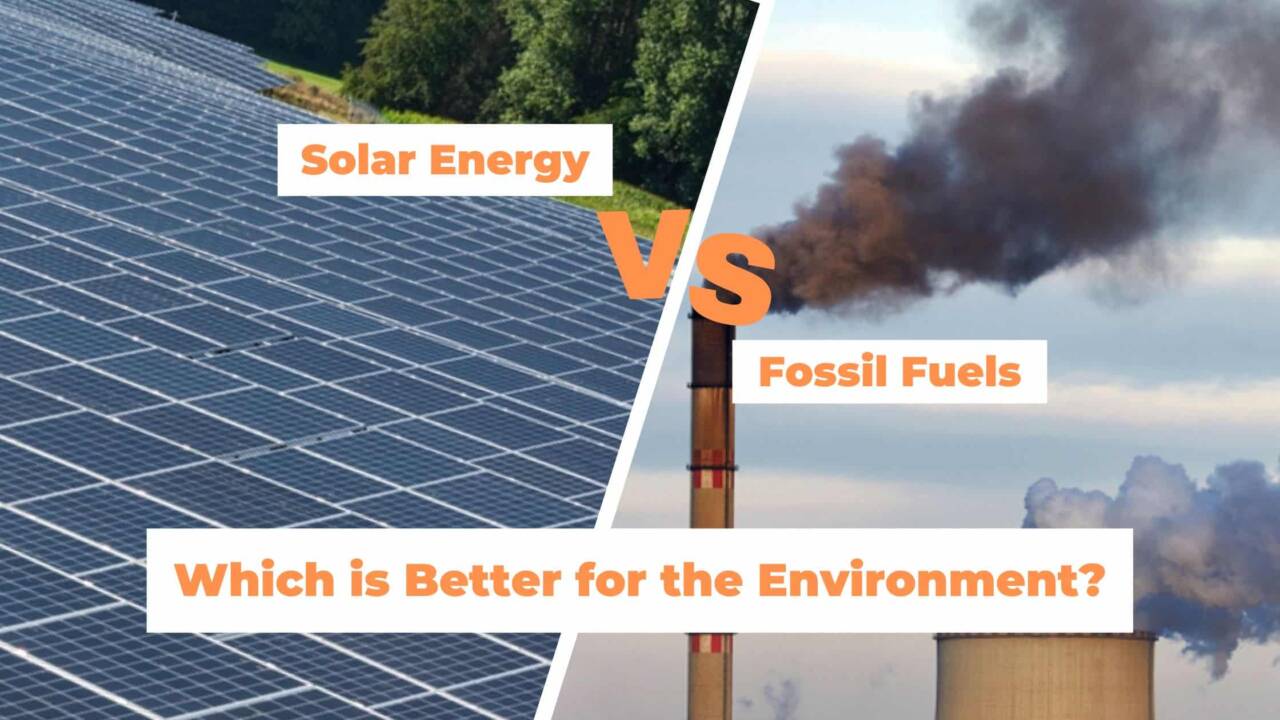NEWS
Is solar energy more environmentally friendly than fossil fuels?

The debate over whether solar energy is more environmentally friendly than fossil fuels is a critical issue today as we grapple with the consequences of climate change and the need to transition to cleaner energy sources. Solar energy, harnessed from the sun’s radiation, has gained prominence as a renewable and sustainable alternative to fossil fuels, which emit greenhouse gases when burned for energy. We will delve into the environmental impact of both solar energy and fossil fuels, investigating elements such as carbon emissions, resource depletion, land use, and overall sustainability to determine which energy source is more environmentally friendly.
Environmental Impact of Fossil Fuels
Fossil fuels, including coal, oil, and natural gas, have been the primary energy sources for centuries, powering industries, transportation, and electricity generation. Nevertheless, fossil fuel extraction, processing, and burning have paramount environmental consequences.
- Greenhouse Gas Emissions: Burning fossil fuels releases carbon dioxide (CO2) and other greenhouse gases into the atmosphere, contributing to global warming and climate change. These emissions are the immediate drivers of the Earth’s rising temperatures, resulting in more frequent and intense weather events, melting polar ice caps, and disrupted ecosystems.
- Air Pollution: Fossil fuel combustion also produces air pollutants such as sulfur dioxide (SO2), nitrogen oxides (NOx), and particulate matter. These pollutants can usher respiratory problems, smog formation, and acid rain, harming human health and the environment.
- Resource Depletion: Fossil fuels are finite resources, and their extraction can destroy landscapes and ecosystems. Mining for coal, drilling for oil, and fracking for natural gas often destroy habitat, water pollution, and soil contamination.
- Oil Spills: Oil transportation via tankers and pipelines poses the risk of catastrophic oil spills, which can devastate marine environments and wildlife. These spills can take years, if not decades, to recover fully.
- Land Use: Large swaths of land are dedicated to mining and drilling operations, disrupting natural habitats and biodiversity. These activities can usher to habitat loss and fragmentation, endangering numerous species.
Environmental Impact of Solar Energy
Solar energy, in distinction, is a renewable and clean energy source that harnesses the power of sunlight through photovoltaic (PV) cells or solar panels. While solar energy has diverse environmental benefits, it is not without its own ecological considerations.
- Carbon Emissions: Solar energy generates electricity without direct emissions of greenhouse gases during operation. Nevertheless, emissions may occur during the manufacturing, transportation, and installation of solar panels, though they are remarkably lower than those linked with fossil fuels.
- Resource Use: The production of solar panels demands diverse materials, enclosing silicon, metals, and chemicals. The extraction and processing of these materials can have environmental impacts, but recycling and sustainable sourcing improvements are mitigating these effects.
- Land Use: Solar installations require land or roof space, which can usher land-use conflicts and habitat disruption. Nevertheless, solar farms can often coexist with agriculture or other land uses, reducing the environmental impact.
- Energy Intermittency: One challenge with solar energy is its intermittency. Energy generation depends on sunlight, meaning electricity production decreases at night and during cloudy weather. This intermittency necessitates energy storage solutions, such as batteries, to ensure a consistent power supply.
Comparing Environmental Impact
When corresponding solar energy’s environmental impact to fossil fuels, it is paramount to evaluate diverse elements.
- Carbon Emissions: Fossil fuels are a primary source of CO2 emissions, contributing significantly to climate change. Solar energy, while not entirely emissions-free due to manufacturing and installation, produces paramountly fewer greenhouse gas emissions during its lifecycle.
- Resource Depletion: Fossil fuels are finite resources that contribute to habitat destruction and ecosystem disruption. Solar energy relies on abundant sunlight, and advancements in sustainable materials and recycling are lessening its resource impact.
- Air Pollution: Fossil fuels release pollutants that harm air quality and human health. Solar energy generates electricity without direct emissions of air pollutants, making it a cleaner option.
- Land Use: Both solar energy and fossil fuels require land use, but the impact differs. Fossil fuel extraction disrupts ecosystems and landscapes, while solar installations can be integrated into existing land uses or repurposed land.
- Water Use: Fossil fuel power plants often require paramount water for cooling, impacting local water resources. Solar energy generally has lower water requirements, making it less burdensome on water supplies.
- Environmental Sustainability: Solar energy is inherently more sustainable in the long term because it relies on an abundant and renewable resource—the sun. Fossil fuels, being finite, cannot offer the same level of sustainability.
In the ongoing debate over solar energy versus fossil fuels, it becomes evident that solar energy holds a more favorable position regarding environmental friendliness. While solar energy does have some environmental considerations, such as resource use and land use, it presents a remarkably lower impact compared to fossil fuels in key areas such as carbon emissions, air pollution, resource depletion, and long-term sustainability.
Harper Harrison is a reporter for The Hear UP. Harper got an internship at the NPR and worked as a reporter and producer. harper has also worked as a reporter for the Medium. Harper covers health and science for The Hear UP.










